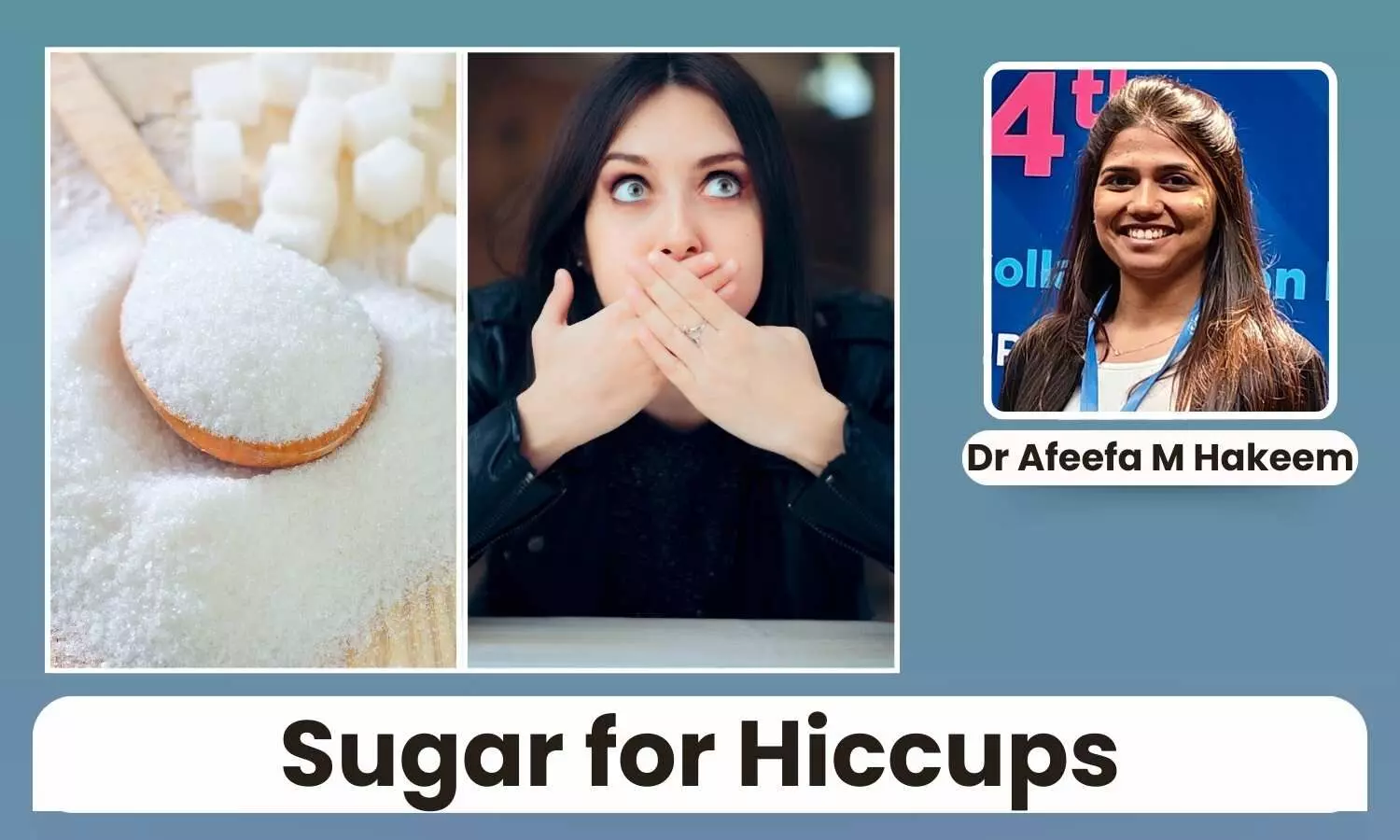Can Eating Sugar Stop Hiccups? - Dr Afeefa M Hakeem

“Sugar vs. Hiccups: The Sweet Trick That Might Just Work!”
Hiccups are one of those weird bodily quirks that everyone experiences at some point. They come out of nowhere, sometimes in the middle of an important meeting or a quiet moment, and can be frustrating to get rid of. Some believe that hiccups are a sign that someone, somewhere, is thinking about you at that very moment. Is that so?
As an emergency physician, I often see patients rushing into the ER, desperate for relief from stubborn hiccups. While most cases are harmless, some can be a sign of something more serious. One of the simplest remedies I recommend trying first? A spoonful of sugar! But does it really work? Let’s break it down.
What Are Hiccups and Why Do They Happen?
Hiccups, or singultus, happen when a major breathing muscle called the diaphragm suddenly contracts (tightens) involuntarily. This causes a rapid intake of air, leading to the closure of the vocal cords, which makes the familiar "hic" sound.
Hiccups can be triggered by simple things like: Eating or drinking too fast Spicy, hot, or carbonated drinks Swallowing too much air (like chewing gum) Sudden emotional stress or excitement Temperature changes (e.g., drinking hot coffee followed by cold water)
Most hiccups go away in a few minutes, but persistent hiccups lasting more than 48 hours could be a sign of something serious.
Can Eating Sugar Really Stop Hiccups?
The idea that sugar helps with hiccups isn’t just an old wives' tale—there’s some science to support it!
As an emergency doctor, I’ve had patients come into the ER panicked about their never-ending hiccups. While there are medical treatments, I often suggest they first try simple, safe home remedies—and sugar is one of the best ones!
Stimulating the Vagus Nerve: The vagus nerve runs from the brain to the stomach and plays a big role in the hiccup reflex. The grainy texture of sugar activates sensory nerves in the throat, which may "reset" the hiccup cycle by distracting the brain.
Overloading the Swallow Reflex: When you swallow dry sugar, your body focuses on processing it, which may interfere with the hiccup reflex.
Brain Distraction: Similar to holding your breath or drinking water, sugar shifts the brain’s attention away from the hiccup reflex.
A 1971 study in the New England Journal of Medicine found that eating a spoonful of sugar cured hiccups in 19 out of 20 patients. While not a guaranteed fix, it’s a simple, safe remedy worth trying!
Other Home Remedies for Hiccups
Besides sugar, there are several other easy techniques that can help stop hiccups:
1. Hold Your Breath
Taking a deep breath and holding it for 10–20 seconds increases carbon dioxide levels in the blood, which may relax the diaphragm and stop hiccups.
2. Drink Ice-Cold Water
Sipping cold water shocks the nervous system and may reset the hiccup reflex. Slowly drinking a full glass of water without stopping can also help.
3. Gargle with Cold Water
Like drinking cold water, gargling with ice-cold water stimulates the vagus nerve and can help stop hiccups.
4. Swallow a Teaspoon of Honey or Peanut Butter
Sticky substances like honey or peanut butter force a slow swallowing motion, which may override the hiccup reflex.
5. Suck on a Lemon or Vinegar
The strong sour taste of lemon or vinegar stimulates the vagus nerve, interrupting the hiccup cycle.
6. Breathe into a Paper Bag
Breathing into a paper bag increases carbon dioxide levels in the blood, which may help relax the diaphragm. (Avoid this if you have heart or lung problems.)
7. Pull Your Knees to Your Chest
Sitting down and pulling your knees up to your chest puts gentle pressure on the diaphragm, which can help stop hiccups.
8. Apply Pressure to the Diaphragm or Carotid Artery
- Gently pressing on the area just below the ribcage may help relax the diaphragm.
- Massaging the carotid artery in the neck (just below the jawline) can stimulate the vagus nerve, but this should be done cautiously.
When Should You See a Doctor?
Most hiccups are harmless, but if they last more than 48 hours, it’s time to see a doctor. In my experience, persistent hiccups can sometimes signal an underlying health issue.
Signs That Hiccups Might Be Serious:
Persistent hiccups (lasting more than 2 days) Hiccups with difficulty swallowing or speaking Weight loss or frequent heartburn (may suggest acid reflux or a tumour) Chest pain or shortness of breath (possible heart or lung issue) Neurological symptoms like dizziness or weakness (could suggest a stroke)
If hiccups don’t stop with home remedies or are accompanied by other symptoms, it's best to see a doctor for further evaluation.
How Do Doctors Treat Persistent Hiccups?
For stubborn hiccups that won’t go away, doctors may try:
Non-Pharmacological Remedies: Holding your breath, drinking cold water, or applying pressure to the eyes can stimulate the vagus nerve and help stop hiccups.
Medications: If hiccups last more than 48 hours, drugs like baclofen, gabapentin, or metoclopramide may be used to calm the nerve signals involved in the hiccup reflex.
Treating the Underlying Cause: If a condition like acid reflux (GERD) or nerve irritation is responsible for the hiccups, treating it can help stop them.
Nerve Block Procedures (Rare Cases): In very extreme cases, doctors may use nerve-blocking injections or even minor surgery to stop chronic hiccups.
Final Verdict: Should You Try Sugar for Hiccups?
Yes! Eating sugar is a quick, easy, and safe remedy that might work for you. But if your hiccups last more than 48 hours, don't ignore them—see a doctor!
As an emergency physician, I’ve seen plenty of hiccup cases, from minor annoyances to serious medical conditions. Trying sugar is a great first step—but if your hiccups persist, don’t hesitate to seek medical help!
Have you ever tried sugar for hiccups? Did it work? Let us know in the comments!


